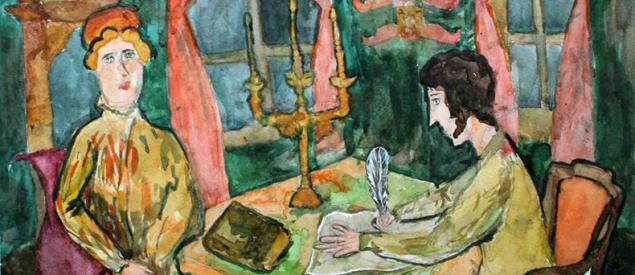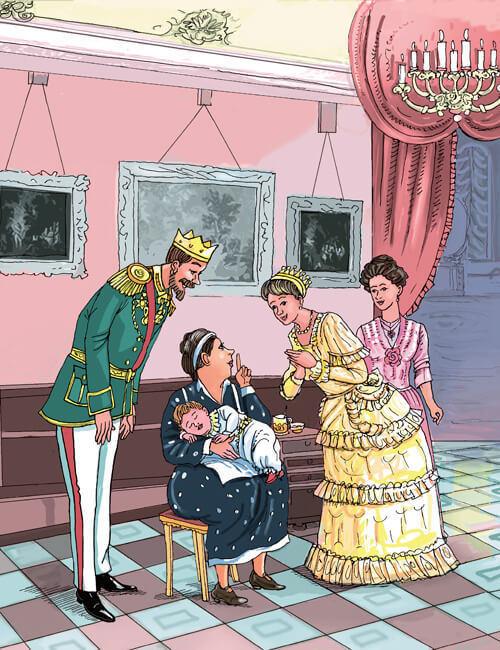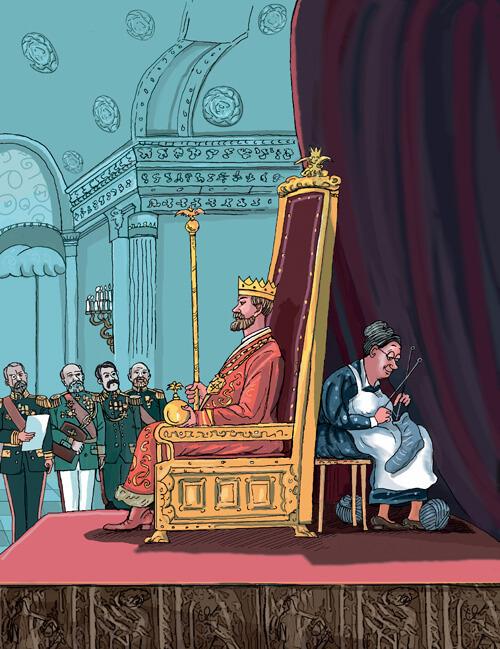1180
Noble babysitting: lessons of unconditional love
Today, from the young mothers can often hear: "We educate children in the noble families ...". Under the noble tradition of education is usually meant to transfer the baby immediately after the birth of the nurse and the nurse: the nurse takes care of all of the baby and the parents continue to lead a secular life.
Dad and Mom, with a shrug, refer to the historical past: "Children brought up by nannies, and what grew - wise, restrained and noble ...»
. To learn how to actually institute was arranged noble nurses, we talked with Marina Melia, a psychologist and author of the book "The secret of the first year of life»
.
Marina, what role was played by the nurse in a noble family?
Fundamentally different than today. At one time, I was interested in this topic, I read a lot of memoirs, including materials about the life of the Russian nobility and the royal family. It turned out that our understanding of the traditions of family education at that time quite superficial, vague, and sometimes just wrong.
Before the revolution, the nurse was not only kings, nobles and merchants, but in almost every wealthy family, where the mother could not afford to take care of children. Motherboard features assumed the nurse. But the "mothers" each month do not change - our great-grandmother is ... grandgrand understood perfectly. Long before the development of the famous John Bowlby's attachment concept, our ancestors created the tradition whereby children in the noble families was a constant object of affection, your reliable adult - babysitting
. In Russian literature and painting there is a gallery of images of the nobility nurses. "The first in the list" - of course, Pushkin's Arina: "A friend of my days of severe, my dove senile ..." And who trusts their girlish secrets Tatyana Larina, fell in love with Onegin? It is not the mother: "Oh, nanny, babysitter, I miss, I'm sick, my dear: I cry, I cry ready ..»
Our poets have dedicated their nannies so much heartfelt lines that fit their parents would be offended. Noble nurse - a truly unique phenomenon. Almost every well-known writer, scholar, statesman had its Arina.
French explorer Jacques Ferrand, in his book "Russian nanny. Memories "defines who is a Russian nanny:" Nurses do not have any maids or nurses or governesses, they were part of the family, a kind of family spirit, an intermediary between parents and children. " In modern parlance, the parents passed nanny part of its powers, and a considerable part.
Parents of children brought up by their presence in the house, and the rest fall on the shoulders of the nurse. Babysitting for a child becoming "number one man" - and everyone in the family knew it, so the attitude to it was warm and respectful
. What is the principle in the noble families choose nannies?
By selecting the nurse approached responsibly, and in the royal family nanny search generally considered a matter of state importance. Before the abolition of serfdom in the nurse and the nurse took, as a rule, the peasant serfs from the villages where people were sober and respectable. Chose women healthy, calm disposition, friendly, good, neat, industrious, devout (before inviting a nurse to the house, spoke to her confessor), ready to love a child, to nurture it, to nurse, nurture, protect.
For a poor peasant get into the nurse was a gift of fate. Therefore, the nurse was a vital, strategic interest is to "come to the court" that the baby was healthy, attached to her, loved her. Nanny knew that if it did not get fired, do not leave without support in old age and disease, that it provides itself "to the grave", for life -. Not just themselves but also their relatives
A typical example - the story of a nurse Tsar Nicholas I Yefrosinia Ershov, a peasant from the Red Village. She had two daughters and a son, who became the Emperor's foster sister and brother. With the death of Nicholas I Yefrosinia relationship with dairy sisters have not stopped: in the accounting records Anna and Avdotya number as the daughter of the deceased nurse and received on holidays due to them "Congratulations." When Anna had a son, the emperor became his godfather, thus becoming related to a peasant family.
Alexander III of Nurse, already very old, came to his palace on certain days. According to Ilya Surguchev, "Alexander III knew that his nurse mamurovuyu loves candy, and specially ordered its factory Bligkena and Robinson».
The Emperor and the nurse had their secrets, they sat on a red couch, talking in whispers and sometimes even quarreling: nurse allegedly reproached him for his zeal to blame, he retorted: "None of your business," and she asked: "Whose is it?".
According Surguchev, "this nurse enjoyed widespread respect in the palace, and there was nothing that would not do for her Alexander. They said that in Livadia, on his deathbed, he thought about it and said, "Ah, if alive was old! I would Vsprysnula with coals, and all as a hand would be lifted. And the professor, pharmacy .... »

What, do you think that unlike the nobility of the modern nanny?
Before the revolution, nannies are not selected as the domestic staff - maid, a gardener, a valet, but as a very important person, that will affect the health and well-being of the heir
. The duty of the nurse was caring for the baby, to surround him with love and care around the clock, day after day, year after year, not like today, where on weekdays baby "loves" one nurse on weekends other, at night the third - who is on duty , and he "loves". Of course, even with the most careful selection there have been mistakes, but the whole setup was as follows:. Babysitter - is forever
Today, everything is simple: we are looking for a nanny for a particular job - to care for a child. If the nurse for some reason does not suit us - no problem, the agency will send another. In any case, it is the employee for us and, therefore, a temporary person. And most nannies our house - just another place of service. In other words, today the nurse - a function, work, profession -. Is the same as any other
For noble babysitting child care was not working, and the main business of her life, her "ministry" and its destiny. Babysitting appeared in the house with the birth of the child and, as a rule, lived to a ripe old age. It lived, and not waited. Here she regained her second family, where everyone believed her nearest and dearest person - both children and adults. It is fully committed to the children and all of its joys and sorrows, too, have been associated with family life.
Devotion babysitting for families and children especially pronounced in troubled times - during the 1917 Revolution and the Civil War. This is a tragic page in the history of the nobility nurses. Most nurses to emigrate with noble families. And those who stayed with their masters, as they could help them, getting the family coal, bread, flour, potatoes. When the parents died or for some reason can not take their children with them, they stayed with nannies.
Emigration often house held only on the nurse: she did everything - kitchen, and children, while her humiliated, steeped in problems gentlemen were trying to somehow earn. Babysitting - calm, wise, balanced, patient - became a central figure in the family, the anchor that held all afloat
. Sometimes that works are just a nanny, and they kept the whole family, fed and their students, and they did not adapted to the life of the parents. Mikhail Romanov prince recalls his nurse knitted woolen socks, and then rode a bicycle 15, and sometimes 30 kilometers to exchange them at least for some products and feed home.
Russian noblewoman Maya Durasova well remembers his nanny Lukiyu: "In 1919, before leaving the Russian land and go abroad, my mother suggested that the nurse to stay and to return to his family, but the nurse said quietly:" Who then will take care of children ...? "Nanny lived in our family from 1913 to 1941. In 1941, she died, and her father gave her a lavish funeral.
Only after her death, we realized that she was dead, possibly from malnutrition - she gave us their ration cards and refused to eat, saying that it is an old and she does not need to eat much ... »
. Noble babysitting received some education?
Not necessarily, although in Moscow and to St. Petersburg, in Tsarskoye Selo, there are even special schools for nurses, where the training lasted for four years. The program was similar to five years in the Lyceum, they added courses of religious education and care for young children. After 1861 in the nurse came, as a rule, the peasant, petty bourgeois and nobility orphaned girls.
And what happens if the nurse allowed some oversights in relation to children?
Noble babysitting, of course, it was also not ideal. But even if the nurse somewhat guilty, did something wrong, it is not expelled. Well, pull up, scold, scold - after all, anything can happen in the family. Yes, "hand full of holes" - how many cups interrupted! So what to do, but for the children it is the native people, the children tied to her, and she sincerely loves them and cares for them, the rest is just to turn a blind eye.
It is now accepted to dismiss nannies for any misconduct as ordinary employee, and the nurse know that can stay overnight "without a place", and therefore without a salary. There are families where the recruitment and dismissal of nurses almost stops - parents are tirelessly looking for a new babysitter in the hope that the next one will be certainly better than the previous
. That is, a noble family was babysitting a special status?
Yes, the nurse could sit at a table with gentlemen, she was allowed to enter the room where the maid is not tolerated. Caste differences between a nanny and her pupils did not exist - the relationship were the most natural, alive, real. Yes, the nurse can treat the child "Vanya" or "master" and "you", and could and strictly on the "you" - "Father Ivan Nikolayevich»
. But at the same time it allowed all the same as the parents: it prohibit or authorize, approve or punished. And if the brewing conflict between the nurse and her pupils, parents get up to the side of the nurse - a hierarchy of relationships observed strictly
. Barskie babysitting live on all ready and at the same time receive a salary and clothing. They went ornate - both at home and in the church, and on walks with the children. Babysitting engaged only child, has devoted itself only to him - no other duties she was not, no one even tried to use it on any work outside the child
. When the family appeared even children, babysitting and doing them, and when they grew up students, the nurse passed "inherited" to their children, and then to the grandchildren. After the abolition of serfdom, many nannies were in the house of their masters - and the point here is, of course, not in the material interest, and amazing dedication of nurses themselves in relationships that have evolved with the family nanny
. Feeling self-respect, their necessity, its importance, knowing that she trusted the most expensive, babysitting so imbued with the consciousness of its debt and high position of the family, that in asserting tribal values were sometimes stricter and integrity of their masters. She saw to it that when the children no one dared to swear, I would not say anything inappropriate, protected the children, not just the physical, but also from the moral damage, nipped in the bud any "peasant habits" of his pupils.

If the nurse had such broad "powers" if it led to conflicts with parents?
Yes, today, I would have probably considered that a nanny too much on yourself takes. And then it was considered normal, because the nurse was a child, in fact, the second mother, with the same rights and the same responsibilities, she was a full member of the family, and not the "caretaker nannies»
. Sometimes, if the representation of the nurse disagreed with the parent, babysitter could even afford to argue with the Lord. The book is the story of Ferran emigrant Hope Korelin about how her nanny, Anna Ivanovna, "while walking could disrupt some carrots in someone else's garden, the house and gave them soap kiddies chew.
Mother made her constantly reprimands: "Nanny, how do you not ashamed to steal, you commit sin, break the commandment of God." - "How is it stealing? - Retorted the nurse. - It's like that for me. I took it for the kids. As it is vegetables belong to another? They belong to the Lord God, and God is not against the fact that they were taken for the children. " And to convince the nurse was not possible. »
If parents died early, it is often the nurse became the guardian of tradition, an older woman in the house. She could pull up the pupil, reminding him that, as was customary in the family to do so-and-so, as befits behave noble offspring, what to do in such cases, his father or mother, and so on. D.
Babysitting allocated with parental functions, but it could allow the child a lot, and when the nurse made him feel relaxed, calm and peaceful. Parents - a "higher authority", and the affection and tenderness - the nurse. This nurse had to wipe tears, comfort, cuddle, spoon-feeding, to blow on broken knees, teach prayers and tell tales.
Nanny could tell all, tell the most intimate, and only then, having received the blessing of her advice and go to talk with the parents. Often nurses have to protect children from parental anger. Writer Tatiana Passek in his memoirs how the nurse saved her when her mother, passionate and impetuous, trying to carve its rod "Nanny rushed after me, begged his mother I have mercy, promised me that" the future will not be " and, if that failed, covered me with his old hands and took them strikes the rod ...
intended me Carved - carried off to the nursery, comforted, prigolublivala and entertaining toys or a fairy tale ... In the evening, putting me to bed, she quietly did pray before the ikon, hanging in the minds of my crib, baptized me, took a chair and sat down beside ... In the morning, I woke up and met the same by peace and love gaze under which to sleep. »
Count Alexander Tolstoy recalled: "... the nurse was a true defender of the family, little Goliath, able to protect against all winds and tribulations. She was always there when we needed it, and presents us infinite warmth and tenderness. Babysitting devoted himself entirely to our family ...
She got a little money, but it was always something for us - a small ticket, coin, sweet ... She always took a bad piece, leaving all of us. And when she died, at the age of 98, she took a piece of a Russian soul of our family. »
Communication with the nurse becomes a child of this outlet, when it sank around the ring Bonn and foreign tutors who spoke a foreign language and often used punishment. Prince Eugene Troubetzkoy talked about his nurse: "... the right to grumble and scold us, it recognized only a
. When scolded governess, nurse immediately rears and makes the center of the opposition ... "Argutai, sissistabel - immediately answered from the other room nurse's bass. - You first baby show grace - the Holy Spirit, and then Argutai sissistabel "»
! "She loved the children to distraction and was so attached to us that we felt his family and loved us more than their own family" - so says a nurse Nadezhda Korelin. And here's what he wrote another book hero Ferrand, Nikolai Suvorov: "My nanny loved me like no one else in my whole life. It was all-out, full of love, without interest, without seeking anything but my happiness and well-being .... »
Probably due to the fact that nannies were, as a rule, from simple peasant, Russian nobles from childhood and are attached to the folklore, and Russian culture?
Yes, for many Russian nobles nurse was the only one close connection with the people. Thanks to its simple nurse, their tales, sayings, parables and jokes, proverbs and sayings noble children from birth heard native speech, and impregnated with the Russian spirit.
It is their love, sorry in Russian, rocked, lulled, protect, play with them, etc. And no one is bothered that the nurse or the nurse was a simple, uneducated woman: amusing, she was brought up - with the help of the very ladushek, pestushek and songs that have been passed by the people from generation to generation
. No wonder even the speech of Russian emperors there, he slipped People patter, inherited them from their village nurses and nurses. В книге Ильи Сургучева «Детство императора Николая II» о царских няньках написано так: «Я отдаю себе отчет, что при невероятной смеси кровей в царской семье эти мамки были, так сказать, драгоценным резервуаром русской крови, которая в виде молока вливалась в жилы романовского дома, и без которой сидеть на русском престоле было бы очень трудно.
Все Романовы, у которых были русские мамки, говорили по-русски с налетом простонародным. Так говорил и Александр Третий. Если он не следил за собой, то в его интонациях, как я понял впоследствии, было что-то от варламовской раскатистости. И я сам не раз слышал его “чивой-то”».
Основы православной веры дети получали также от няни: она учила, как стоять в церкви, как молиться, как и что делать в праздники. Майя Дурасова пишет, что няня «без громких слов смогла передать моим братьям и мне веру в доброту, в Спасителя, научила понимать смысл молитв. Она жила с верой в Христа, Божью Матерь, святых и никогда не жаловалась на свою судьбу».
Возможно, простая русская няня вносила свою лепту и в «патриотическое воспитание» — ведь она создавала привязанность не только к себе, но и к родной земле, к родному языку.
В результате вырастали люди европейской культуры, но русские по духу. Это замечательно иллюстрирует эпизод из «Войны и мира» Льва Николаевича Толстого, когда Наташа Ростова, воспитанная француженкой, в гостях у дядюшки неожиданно для всех начинает танцевать «барыню» так, что все поражены — откуда в ней этот русский дух? А действительно, откуда? От семьи. И, возможно, от няни.
Сегодня мы редко вспоминаем о своих корнях. Мы растим детей на чужих сказках, на диснеевских мультиках, даже нанимаем няню-иностранку в надежде, что она научит ребенка английскому или французскому, и безумно радуемся, если наш малыш, не успев как следует выучить русский, уже говорит на чужом языке. Мы стремимся воспитать ребенка гражданином мира, заранее присматриваем ему какую-нибудь европейскую частную школу, колледж, университет…
Безусловно, и знание языков, и умение чувствовать себя свободно в любой стране важны, но не менее важно помнить, кто мы и откуда, ощущать свою принадлежность к кому-то и чему-то — это дает нам психологическую устойчивость и необходимо каждому. И русские аристократы это отлично понимали: много времени проводившие за границей, прекрасно говорившие и читавшие на нескольких языках, они были не просто князьями, а русскими князьями.
Да, во многих дворянских домах принято было говорить между собой по-французски, во всяком случае какие-то важные, изящные или пикантные моменты обсуждались исключительно на французском. И приставленные к детям бонны и гувернеры, как правило, были иностранцами. Но няни в доме были русскими!

Что такого было в этих простых женщинах, что воспитанники любили и почитали их всю свою жизнь?
Я думаю, это бесконечная доброта, преданность, верность семье, терпение, мудрость, религиозность, чувство собственного достоинства, жертвенность. А главное, они просто любили детей, любили беззаветно и преданно — так, как, казалось бы, может любить только родная мать.
Об этой взаимной любви удивительно трогательно и поэтично сказал князь Михаил Романов: «Мы вместе прошли жизненный путь длиной в 50 лет. Я не всегда был там, где она была, потому что приходилось все время работать, очень часто далеко от дома. Но каждый раз, возвращаясь, я знал, что она будет здесь. Ее старый платок на голове, ее блузка, ее ночная рубашка, ее улыбка, ее открытые руки. Когда я ее обнимал, она мягко стучала мне по спине, желая сказать “Аккуратно, аккуратно, не сломай меня”. С первого взгляда она знала, если у меня с работой шло все хорошо или если были трудности. Я настаиваю на этом, она не угадывала, она просто знала… Годы проходили, и из подростка я стал мужчиной. Но не для нее. Та же любовь, нежные слова, поцелуи, благословение на прощание, пусть даже я покидал дом всего на несколько часов — были одинаковы. Она научила меня многому, но главное, это был урок абсолютной любви, которая была всегда, в каждый момент нашей жизни, и во всем — и в маленьких, и в больших вещах. Для меня, Фима, ты всегда со мной. И однажды, когда я тоже окажусь “по ту сторону”, я встречу душу кого-то, кто меня возьмет за руку. Это будешь ты, моя няня…».
Конечно, в наше время было бы наивно призывать брать няню, чужого человека, пусть даже замечательного, в дом, в семью навсегда. Да это и не нужно — и мир другой, и мы другие. Все изменилось кардинально — люди, жизнь, отношения. И прекрасная русская традиция, вероятно, безвозвратно утеряна. Но сегодня, когда мы говорим «делаем, как у них», надо четко представлять, а как именно было у них и как есть у нас.
Вот мама-княгиня встречается с детьми за обедом, благословляет их на сон грядущий, целует перед отъездом на бал. Вот она отправляется на курорт, оставляя детей с няней… И у нас вроде бы все то же самое: одни мамы с утра до вечера пропадают в офисе, другие занимаются делами — сначала фитнес, потом встреча с друзьями, вечером театр, концерт или светское мероприятие. Уезжая за границу, мама тоже оставляет детей с няней, да еще и наблюдает с помощью видеокамеры, что происходит в доме.
Да, и в том, и в другом случае детьми занимается няня. Но на этом сходство и заканчивается. Дворянские мамы, в отличие от нас, прежде чем упорхнуть на бал, заботились о том, чтобы ребенок не чувствовал себя одиноким и заброшенным. Мы совсем не идеализируем ни дворянских мам, ни дворянских нянь — понятно, что и в те времена бывало всякое, — но существовала определенная традиция, система.
И благодаря ей рядом с малышом всегда был близкий человек, который обеспечивал ему безопасность, покой, тепло, заботу, внимание, для которого ребенок стал родным, готовый посвятить ему и его семье всю свою жизнь.
Можем ли мы сегодня создать детям те же условия, какие были в дворянских домах? Наверное, можем, если с нашим ребенком будет не временщик, а любящий и преданный ребенку человек. И только тогда мы можем быть спокойны за наших детей и с легким сердцем «отправляться на бал».
Dad and Mom, with a shrug, refer to the historical past: "Children brought up by nannies, and what grew - wise, restrained and noble ...»
. To learn how to actually institute was arranged noble nurses, we talked with Marina Melia, a psychologist and author of the book "The secret of the first year of life»
.

Marina, what role was played by the nurse in a noble family?
Fundamentally different than today. At one time, I was interested in this topic, I read a lot of memoirs, including materials about the life of the Russian nobility and the royal family. It turned out that our understanding of the traditions of family education at that time quite superficial, vague, and sometimes just wrong.
Before the revolution, the nurse was not only kings, nobles and merchants, but in almost every wealthy family, where the mother could not afford to take care of children. Motherboard features assumed the nurse. But the "mothers" each month do not change - our great-grandmother is ... grandgrand understood perfectly. Long before the development of the famous John Bowlby's attachment concept, our ancestors created the tradition whereby children in the noble families was a constant object of affection, your reliable adult - babysitting
. In Russian literature and painting there is a gallery of images of the nobility nurses. "The first in the list" - of course, Pushkin's Arina: "A friend of my days of severe, my dove senile ..." And who trusts their girlish secrets Tatyana Larina, fell in love with Onegin? It is not the mother: "Oh, nanny, babysitter, I miss, I'm sick, my dear: I cry, I cry ready ..»
Our poets have dedicated their nannies so much heartfelt lines that fit their parents would be offended. Noble nurse - a truly unique phenomenon. Almost every well-known writer, scholar, statesman had its Arina.
French explorer Jacques Ferrand, in his book "Russian nanny. Memories "defines who is a Russian nanny:" Nurses do not have any maids or nurses or governesses, they were part of the family, a kind of family spirit, an intermediary between parents and children. " In modern parlance, the parents passed nanny part of its powers, and a considerable part.
Parents of children brought up by their presence in the house, and the rest fall on the shoulders of the nurse. Babysitting for a child becoming "number one man" - and everyone in the family knew it, so the attitude to it was warm and respectful
. What is the principle in the noble families choose nannies?
By selecting the nurse approached responsibly, and in the royal family nanny search generally considered a matter of state importance. Before the abolition of serfdom in the nurse and the nurse took, as a rule, the peasant serfs from the villages where people were sober and respectable. Chose women healthy, calm disposition, friendly, good, neat, industrious, devout (before inviting a nurse to the house, spoke to her confessor), ready to love a child, to nurture it, to nurse, nurture, protect.
For a poor peasant get into the nurse was a gift of fate. Therefore, the nurse was a vital, strategic interest is to "come to the court" that the baby was healthy, attached to her, loved her. Nanny knew that if it did not get fired, do not leave without support in old age and disease, that it provides itself "to the grave", for life -. Not just themselves but also their relatives
A typical example - the story of a nurse Tsar Nicholas I Yefrosinia Ershov, a peasant from the Red Village. She had two daughters and a son, who became the Emperor's foster sister and brother. With the death of Nicholas I Yefrosinia relationship with dairy sisters have not stopped: in the accounting records Anna and Avdotya number as the daughter of the deceased nurse and received on holidays due to them "Congratulations." When Anna had a son, the emperor became his godfather, thus becoming related to a peasant family.
Alexander III of Nurse, already very old, came to his palace on certain days. According to Ilya Surguchev, "Alexander III knew that his nurse mamurovuyu loves candy, and specially ordered its factory Bligkena and Robinson».
The Emperor and the nurse had their secrets, they sat on a red couch, talking in whispers and sometimes even quarreling: nurse allegedly reproached him for his zeal to blame, he retorted: "None of your business," and she asked: "Whose is it?".
According Surguchev, "this nurse enjoyed widespread respect in the palace, and there was nothing that would not do for her Alexander. They said that in Livadia, on his deathbed, he thought about it and said, "Ah, if alive was old! I would Vsprysnula with coals, and all as a hand would be lifted. And the professor, pharmacy .... »

What, do you think that unlike the nobility of the modern nanny?
Before the revolution, nannies are not selected as the domestic staff - maid, a gardener, a valet, but as a very important person, that will affect the health and well-being of the heir
. The duty of the nurse was caring for the baby, to surround him with love and care around the clock, day after day, year after year, not like today, where on weekdays baby "loves" one nurse on weekends other, at night the third - who is on duty , and he "loves". Of course, even with the most careful selection there have been mistakes, but the whole setup was as follows:. Babysitter - is forever
Today, everything is simple: we are looking for a nanny for a particular job - to care for a child. If the nurse for some reason does not suit us - no problem, the agency will send another. In any case, it is the employee for us and, therefore, a temporary person. And most nannies our house - just another place of service. In other words, today the nurse - a function, work, profession -. Is the same as any other
For noble babysitting child care was not working, and the main business of her life, her "ministry" and its destiny. Babysitting appeared in the house with the birth of the child and, as a rule, lived to a ripe old age. It lived, and not waited. Here she regained her second family, where everyone believed her nearest and dearest person - both children and adults. It is fully committed to the children and all of its joys and sorrows, too, have been associated with family life.
Devotion babysitting for families and children especially pronounced in troubled times - during the 1917 Revolution and the Civil War. This is a tragic page in the history of the nobility nurses. Most nurses to emigrate with noble families. And those who stayed with their masters, as they could help them, getting the family coal, bread, flour, potatoes. When the parents died or for some reason can not take their children with them, they stayed with nannies.
Emigration often house held only on the nurse: she did everything - kitchen, and children, while her humiliated, steeped in problems gentlemen were trying to somehow earn. Babysitting - calm, wise, balanced, patient - became a central figure in the family, the anchor that held all afloat
. Sometimes that works are just a nanny, and they kept the whole family, fed and their students, and they did not adapted to the life of the parents. Mikhail Romanov prince recalls his nurse knitted woolen socks, and then rode a bicycle 15, and sometimes 30 kilometers to exchange them at least for some products and feed home.
Russian noblewoman Maya Durasova well remembers his nanny Lukiyu: "In 1919, before leaving the Russian land and go abroad, my mother suggested that the nurse to stay and to return to his family, but the nurse said quietly:" Who then will take care of children ...? "Nanny lived in our family from 1913 to 1941. In 1941, she died, and her father gave her a lavish funeral.
Only after her death, we realized that she was dead, possibly from malnutrition - she gave us their ration cards and refused to eat, saying that it is an old and she does not need to eat much ... »
. Noble babysitting received some education?
Not necessarily, although in Moscow and to St. Petersburg, in Tsarskoye Selo, there are even special schools for nurses, where the training lasted for four years. The program was similar to five years in the Lyceum, they added courses of religious education and care for young children. After 1861 in the nurse came, as a rule, the peasant, petty bourgeois and nobility orphaned girls.
And what happens if the nurse allowed some oversights in relation to children?
Noble babysitting, of course, it was also not ideal. But even if the nurse somewhat guilty, did something wrong, it is not expelled. Well, pull up, scold, scold - after all, anything can happen in the family. Yes, "hand full of holes" - how many cups interrupted! So what to do, but for the children it is the native people, the children tied to her, and she sincerely loves them and cares for them, the rest is just to turn a blind eye.
It is now accepted to dismiss nannies for any misconduct as ordinary employee, and the nurse know that can stay overnight "without a place", and therefore without a salary. There are families where the recruitment and dismissal of nurses almost stops - parents are tirelessly looking for a new babysitter in the hope that the next one will be certainly better than the previous
. That is, a noble family was babysitting a special status?
Yes, the nurse could sit at a table with gentlemen, she was allowed to enter the room where the maid is not tolerated. Caste differences between a nanny and her pupils did not exist - the relationship were the most natural, alive, real. Yes, the nurse can treat the child "Vanya" or "master" and "you", and could and strictly on the "you" - "Father Ivan Nikolayevich»
. But at the same time it allowed all the same as the parents: it prohibit or authorize, approve or punished. And if the brewing conflict between the nurse and her pupils, parents get up to the side of the nurse - a hierarchy of relationships observed strictly
. Barskie babysitting live on all ready and at the same time receive a salary and clothing. They went ornate - both at home and in the church, and on walks with the children. Babysitting engaged only child, has devoted itself only to him - no other duties she was not, no one even tried to use it on any work outside the child
. When the family appeared even children, babysitting and doing them, and when they grew up students, the nurse passed "inherited" to their children, and then to the grandchildren. After the abolition of serfdom, many nannies were in the house of their masters - and the point here is, of course, not in the material interest, and amazing dedication of nurses themselves in relationships that have evolved with the family nanny
. Feeling self-respect, their necessity, its importance, knowing that she trusted the most expensive, babysitting so imbued with the consciousness of its debt and high position of the family, that in asserting tribal values were sometimes stricter and integrity of their masters. She saw to it that when the children no one dared to swear, I would not say anything inappropriate, protected the children, not just the physical, but also from the moral damage, nipped in the bud any "peasant habits" of his pupils.

If the nurse had such broad "powers" if it led to conflicts with parents?
Yes, today, I would have probably considered that a nanny too much on yourself takes. And then it was considered normal, because the nurse was a child, in fact, the second mother, with the same rights and the same responsibilities, she was a full member of the family, and not the "caretaker nannies»
. Sometimes, if the representation of the nurse disagreed with the parent, babysitter could even afford to argue with the Lord. The book is the story of Ferran emigrant Hope Korelin about how her nanny, Anna Ivanovna, "while walking could disrupt some carrots in someone else's garden, the house and gave them soap kiddies chew.
Mother made her constantly reprimands: "Nanny, how do you not ashamed to steal, you commit sin, break the commandment of God." - "How is it stealing? - Retorted the nurse. - It's like that for me. I took it for the kids. As it is vegetables belong to another? They belong to the Lord God, and God is not against the fact that they were taken for the children. " And to convince the nurse was not possible. »
If parents died early, it is often the nurse became the guardian of tradition, an older woman in the house. She could pull up the pupil, reminding him that, as was customary in the family to do so-and-so, as befits behave noble offspring, what to do in such cases, his father or mother, and so on. D.
Babysitting allocated with parental functions, but it could allow the child a lot, and when the nurse made him feel relaxed, calm and peaceful. Parents - a "higher authority", and the affection and tenderness - the nurse. This nurse had to wipe tears, comfort, cuddle, spoon-feeding, to blow on broken knees, teach prayers and tell tales.
Nanny could tell all, tell the most intimate, and only then, having received the blessing of her advice and go to talk with the parents. Often nurses have to protect children from parental anger. Writer Tatiana Passek in his memoirs how the nurse saved her when her mother, passionate and impetuous, trying to carve its rod "Nanny rushed after me, begged his mother I have mercy, promised me that" the future will not be " and, if that failed, covered me with his old hands and took them strikes the rod ...
intended me Carved - carried off to the nursery, comforted, prigolublivala and entertaining toys or a fairy tale ... In the evening, putting me to bed, she quietly did pray before the ikon, hanging in the minds of my crib, baptized me, took a chair and sat down beside ... In the morning, I woke up and met the same by peace and love gaze under which to sleep. »
Count Alexander Tolstoy recalled: "... the nurse was a true defender of the family, little Goliath, able to protect against all winds and tribulations. She was always there when we needed it, and presents us infinite warmth and tenderness. Babysitting devoted himself entirely to our family ...
She got a little money, but it was always something for us - a small ticket, coin, sweet ... She always took a bad piece, leaving all of us. And when she died, at the age of 98, she took a piece of a Russian soul of our family. »
Communication with the nurse becomes a child of this outlet, when it sank around the ring Bonn and foreign tutors who spoke a foreign language and often used punishment. Prince Eugene Troubetzkoy talked about his nurse: "... the right to grumble and scold us, it recognized only a
. When scolded governess, nurse immediately rears and makes the center of the opposition ... "Argutai, sissistabel - immediately answered from the other room nurse's bass. - You first baby show grace - the Holy Spirit, and then Argutai sissistabel "»
! "She loved the children to distraction and was so attached to us that we felt his family and loved us more than their own family" - so says a nurse Nadezhda Korelin. And here's what he wrote another book hero Ferrand, Nikolai Suvorov: "My nanny loved me like no one else in my whole life. It was all-out, full of love, without interest, without seeking anything but my happiness and well-being .... »
Probably due to the fact that nannies were, as a rule, from simple peasant, Russian nobles from childhood and are attached to the folklore, and Russian culture?
Yes, for many Russian nobles nurse was the only one close connection with the people. Thanks to its simple nurse, their tales, sayings, parables and jokes, proverbs and sayings noble children from birth heard native speech, and impregnated with the Russian spirit.
It is their love, sorry in Russian, rocked, lulled, protect, play with them, etc. And no one is bothered that the nurse or the nurse was a simple, uneducated woman: amusing, she was brought up - with the help of the very ladushek, pestushek and songs that have been passed by the people from generation to generation
. No wonder even the speech of Russian emperors there, he slipped People patter, inherited them from their village nurses and nurses. В книге Ильи Сургучева «Детство императора Николая II» о царских няньках написано так: «Я отдаю себе отчет, что при невероятной смеси кровей в царской семье эти мамки были, так сказать, драгоценным резервуаром русской крови, которая в виде молока вливалась в жилы романовского дома, и без которой сидеть на русском престоле было бы очень трудно.
Все Романовы, у которых были русские мамки, говорили по-русски с налетом простонародным. Так говорил и Александр Третий. Если он не следил за собой, то в его интонациях, как я понял впоследствии, было что-то от варламовской раскатистости. И я сам не раз слышал его “чивой-то”».
Основы православной веры дети получали также от няни: она учила, как стоять в церкви, как молиться, как и что делать в праздники. Майя Дурасова пишет, что няня «без громких слов смогла передать моим братьям и мне веру в доброту, в Спасителя, научила понимать смысл молитв. Она жила с верой в Христа, Божью Матерь, святых и никогда не жаловалась на свою судьбу».
Возможно, простая русская няня вносила свою лепту и в «патриотическое воспитание» — ведь она создавала привязанность не только к себе, но и к родной земле, к родному языку.
В результате вырастали люди европейской культуры, но русские по духу. Это замечательно иллюстрирует эпизод из «Войны и мира» Льва Николаевича Толстого, когда Наташа Ростова, воспитанная француженкой, в гостях у дядюшки неожиданно для всех начинает танцевать «барыню» так, что все поражены — откуда в ней этот русский дух? А действительно, откуда? От семьи. И, возможно, от няни.
Сегодня мы редко вспоминаем о своих корнях. Мы растим детей на чужих сказках, на диснеевских мультиках, даже нанимаем няню-иностранку в надежде, что она научит ребенка английскому или французскому, и безумно радуемся, если наш малыш, не успев как следует выучить русский, уже говорит на чужом языке. Мы стремимся воспитать ребенка гражданином мира, заранее присматриваем ему какую-нибудь европейскую частную школу, колледж, университет…
Безусловно, и знание языков, и умение чувствовать себя свободно в любой стране важны, но не менее важно помнить, кто мы и откуда, ощущать свою принадлежность к кому-то и чему-то — это дает нам психологическую устойчивость и необходимо каждому. И русские аристократы это отлично понимали: много времени проводившие за границей, прекрасно говорившие и читавшие на нескольких языках, они были не просто князьями, а русскими князьями.
Да, во многих дворянских домах принято было говорить между собой по-французски, во всяком случае какие-то важные, изящные или пикантные моменты обсуждались исключительно на французском. И приставленные к детям бонны и гувернеры, как правило, были иностранцами. Но няни в доме были русскими!

Что такого было в этих простых женщинах, что воспитанники любили и почитали их всю свою жизнь?
Я думаю, это бесконечная доброта, преданность, верность семье, терпение, мудрость, религиозность, чувство собственного достоинства, жертвенность. А главное, они просто любили детей, любили беззаветно и преданно — так, как, казалось бы, может любить только родная мать.
Об этой взаимной любви удивительно трогательно и поэтично сказал князь Михаил Романов: «Мы вместе прошли жизненный путь длиной в 50 лет. Я не всегда был там, где она была, потому что приходилось все время работать, очень часто далеко от дома. Но каждый раз, возвращаясь, я знал, что она будет здесь. Ее старый платок на голове, ее блузка, ее ночная рубашка, ее улыбка, ее открытые руки. Когда я ее обнимал, она мягко стучала мне по спине, желая сказать “Аккуратно, аккуратно, не сломай меня”. С первого взгляда она знала, если у меня с работой шло все хорошо или если были трудности. Я настаиваю на этом, она не угадывала, она просто знала… Годы проходили, и из подростка я стал мужчиной. Но не для нее. Та же любовь, нежные слова, поцелуи, благословение на прощание, пусть даже я покидал дом всего на несколько часов — были одинаковы. Она научила меня многому, но главное, это был урок абсолютной любви, которая была всегда, в каждый момент нашей жизни, и во всем — и в маленьких, и в больших вещах. Для меня, Фима, ты всегда со мной. И однажды, когда я тоже окажусь “по ту сторону”, я встречу душу кого-то, кто меня возьмет за руку. Это будешь ты, моя няня…».
Конечно, в наше время было бы наивно призывать брать няню, чужого человека, пусть даже замечательного, в дом, в семью навсегда. Да это и не нужно — и мир другой, и мы другие. Все изменилось кардинально — люди, жизнь, отношения. И прекрасная русская традиция, вероятно, безвозвратно утеряна. Но сегодня, когда мы говорим «делаем, как у них», надо четко представлять, а как именно было у них и как есть у нас.
Вот мама-княгиня встречается с детьми за обедом, благословляет их на сон грядущий, целует перед отъездом на бал. Вот она отправляется на курорт, оставляя детей с няней… И у нас вроде бы все то же самое: одни мамы с утра до вечера пропадают в офисе, другие занимаются делами — сначала фитнес, потом встреча с друзьями, вечером театр, концерт или светское мероприятие. Уезжая за границу, мама тоже оставляет детей с няней, да еще и наблюдает с помощью видеокамеры, что происходит в доме.
Да, и в том, и в другом случае детьми занимается няня. Но на этом сходство и заканчивается. Дворянские мамы, в отличие от нас, прежде чем упорхнуть на бал, заботились о том, чтобы ребенок не чувствовал себя одиноким и заброшенным. Мы совсем не идеализируем ни дворянских мам, ни дворянских нянь — понятно, что и в те времена бывало всякое, — но существовала определенная традиция, система.
И благодаря ей рядом с малышом всегда был близкий человек, который обеспечивал ему безопасность, покой, тепло, заботу, внимание, для которого ребенок стал родным, готовый посвятить ему и его семье всю свою жизнь.
Можем ли мы сегодня создать детям те же условия, какие были в дворянских домах? Наверное, можем, если с нашим ребенком будет не временщик, а любящий и преданный ребенку человек. И только тогда мы можем быть спокойны за наших детей и с легким сердцем «отправляться на бал».
Training for the torso, which will help to strengthen and restore the spirit of the press
To be able to understand people: 8 essential qualities























